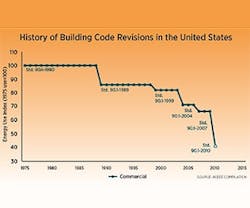U.S. Has Work to Do, International Energy Efficiency Scorecard Reveals
Wondering why the U.S.’s status as global elite is dwindling? Energy efficiency could be a factor.
The United States is less efficient than the entire E.U., China, Japan, and Australia, according to a report by the American Council for an Energy-Efficient Economy (ACEEE).
Countries that use energy more efficiently use fewer resources to achieve the same goals, thus reducing costs, preserving valuable natural resources, and gaining a competitive edge over other countries.
On the International Energy Efficiency Scorecard, the U.S. scored 47 out of an available 100 points, 20 below the United Kingdom’s top score. The report analyzed 12 of the world’s largest economies representing over 78% of global gross domestic product and 63% of global energy consumption.
The 27 metrics evaluated in the report were divided across the three primary sectors responsible for energy consumption in economically developed countries: buildings, industry, and transportation.
The U.S. scored relatively well in the buildings and industrial sections, but very poorly in the transportation section, which helped bring it down to the bottom tier of countries analyzed. The U.S. tied for fourth overall in the buildings section due to its very high score in appliance and equipment standards. It also earned full credit for residential and commercial building codes in spite of having no national mandate because a large number of states have had standards in place since 1975. The impact these standards have had on efficiency over the years is illustrated in the graph below.
While standards have brought vast improvement, the area in which the U.S. could improve building performance the most is in energy consumed per square foot of floor area for both residential and commercial buildings. In spite of dramatic improvements in model building codes for new construction implemented by states, the energy consumption of existing buildings has improved little, if at all, over the last decade.
The report suggests the U.S. could implement national building labeling and energy disclosure programs and improve labeling and energy disclosure for appliances and equipment. Current non-governmental voluntary programs include LEED, Green Globes, and ENERGY STAR.
The report poses a critical question: how can the U.S compete globally if it continues to waste money and energy that other industrialized nations can save and reinvest? It offers several recommendations, including setting a national energy savings target, creating more financial incentives to spur private investment, and making states use the most recent and stringent building code standards.
